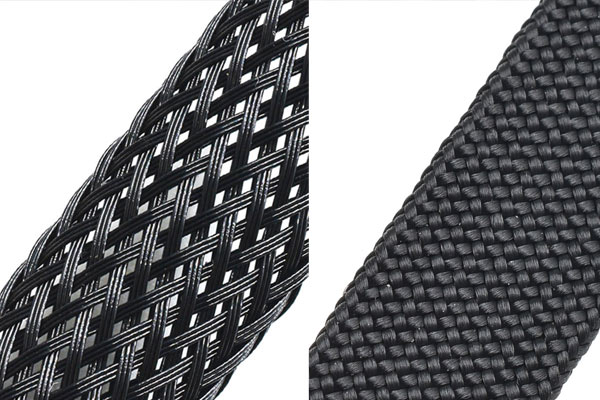Monofilament vs Multifilament Braided Sleeving Choose the Right Cable Protection Solution
In data centers, industrial control, consumer electronics, and other wiring projects, selecting the right braided sleeving is crucial. Different sleeving structures not only affect cable protection but also determine wiring aesthetics and durability. We will help you quickly understand the differences between Monofilament Braided Sleeving and Multifilament Braided Sleeving, and recommend suitable applications.
1. Structure and Feel
-
Monofilament Braided Sleeving: Made from single, uniform filaments, with clear mesh and slightly rigid lines. The sleeving feels firm yet elastic.
-
Multifilament Braided Sleeving: Made from multiple fine strands twisted into yarn-like structures. The surface is smooth and soft, with delicate texture that closely conforms to the cable bundle.
Recommendation: Choose monofilament sleeving for projects requiring rigidity and abrasion resistance; choose multifilament sleeving for projects emphasizing appearance and tactile feel.
2. Performance Comparison
| Feature | Monofilament | Multifilament |
| Abrasion Resistance | High, ideal for industrial/mechanical use | Lower, suitable for low-wear environments |
| Flexibility | Medium | High, easy to bend |
| Compressibility | Good elasticity, strong recovery | Soft, easily compressible |
| Ventilation | Excellent, uniform mesh allows airflow | Slightly less breathable, dense but smooth |
| Tensile Strength | High, firm structure | Slightly lower, suitable for light-load cables |
| Heat Resistance | High, ideal for industrial applications | Moderate, typically up to 125°C |
3. Appearance and Applications
Monofilament Braided Sleeving
- Industrial look, single color, clear 3D texture
- Typical Applications: Industrial control harnesses, automotive wiring, motor cables
- Features: Durable, strong support, suitable for environments needing heavy-duty protection
Multifilament Braided Sleeving
- Smooth surface, can be multicolored or gradient, visually appealing
- Typical Applications: Consumer electronics wiring, smart home devices, audio cables
- Features: Soft and conforming, ideal for indoor cable management and decorative applications
4. Cost and Customization
-
Monofilament: Lower cost, suitable for bulk industrial procurement
-
Multifilament: Slightly higher cost, customizable colors and lengths for mid-to-high-end projects
-
Flame Retardancy: Both types can be customized to UL94 V0 flame retardant rating
5. Our Product Recommendations
we offer a variety of monofilament and multifilament braided sleeving options:
-
Monofilament Series: Abrasion-resistant, high tensile strength, ideal for industrial, automotive, and mechanical applications
-
Multifilament Series: Soft, smooth, aesthetically pleasing, perfect for consumer electronics, smart homes, and premium wiring projects
Whether for a new data center, industrial automation harness, or smart home wiring, we provide metered supply and customizable lengths/colors to meet your project requirements.
Choosing the right braided sleeving depends on environment, cable type, abrasion resistance, flexibility, appearance, and cost.
-
Monofilament: Industrial-grade, high durability, strong protection
-
Multifilament: Indoor-grade, soft and attractive, comfortable feel
